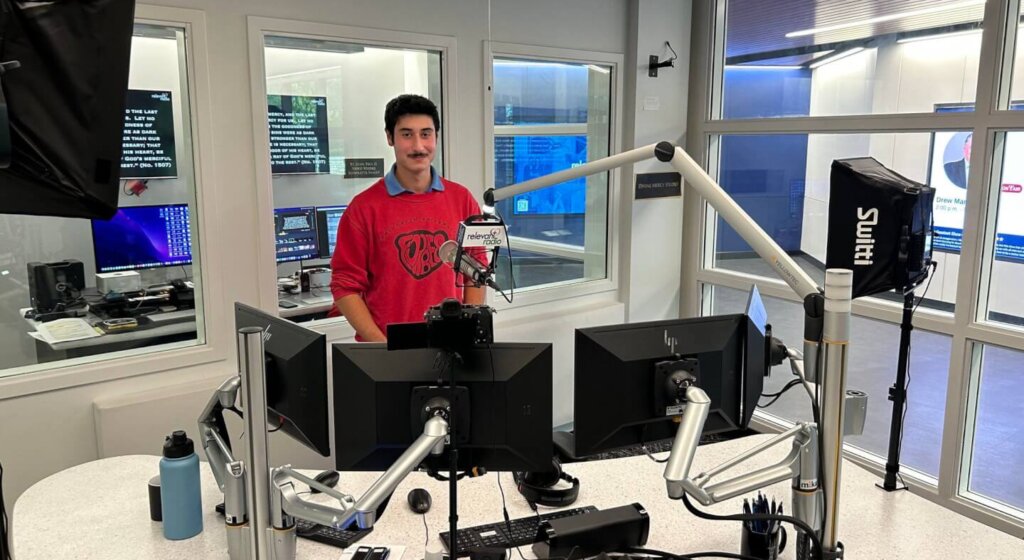Nestled into the same region as Israel, Palestine, Syria, Iraq and Iran lies the small Christian country of Armenia. Deacon Bedros Maldjian (pictured below in red with 2026 classmates), a current student at Princeton University, loves his Armenian heritage, especially how ancient their Christian roots are: “For us, our culture is centered around Christ and around the Church, because Armenia was the first Christian nation.”
With a population of about 3 million, Armenia’s acceptance of Christianity extends back to 301 AD – before the Roman Empire made Christianity legal. This first Christian nation is missing almost 30,000 people after a siege last week.
While media watches conflicts unfold elsewhere, Deacon Maldjian calls for attention to this ethnic cleansing and, ultimately, religious battle of the Armenian Apostolic Church and culture he loves so dearly. He has been involved in his church since he was in third grade, when he accidentally ended up as an acolyte after his mother encouraged him to light the altar candles. Now a sub-deacon, he has been excited to see the developing reconciliation between the Roman Catholic Church and the Armenian Apostolic Church – and calls for our prayers and help.

The 19-year-old Music and Pre-Med major joined The Drew Mariani Show on October 20th to shed light on the ongoing ethnic cleansing occurring in Armenia from its Muslim neighbors, Turkey and Azerbaijan. Artsakh, Armenian land that has been disputed between the Christian country and its Azer neighbor, contained over 120,000 Armenians, making the area over 90% Armenian.
Armenia and neighboring Azerbaijan joined the now-dismantled USSR around the same time, and to prevent an anti-communist uprising, Armenians and Azers were ethnically separated. The disputed land, called Artsakh, was given to Azerbaijan, but after both nations declared independence from Russia in the 90s, the hugely Armenian territory became independent from Azerbaijan and re-joined Armenia after many conflicts in the Caucasus.
Then, in 2020, Artsakh was attacked again for 44 days; Azerbaijan controlled the majority of Artsakh after the Russia-assisted ceasefire was called. Tensions remained fragile as the Azer-controlled cities blockaded the remaining Armenian villages. Food, water, and medicine were hard to come by during the ten-month siege, and even now it’s difficult to find the truth of the situation, says Deacon Maldjian.
Last week, Artsakh became totally under Azer control. Armenians fled or were “relocated,” and 30,000 Christians are missing at present. Deacon Maldjian fears for them, because any time “relocation” has happened in Armenia’s history, which includes two genocides by Turkey in 1915 and in the 1890s, it has meant massacre.
“My great-grandmother was in the Armenian genocide in 1915 and relocated,” he shared with guest host Ed Morrisey. “She was put on a death march and she was saved by a Kurdish man who, at random, picked her up and saved her from starvation.”
The man had chosen to save two boys and two girls from the march, and Deacon Maldjian’s great-grandmother was one. His great-grandfather, who also lived in the disputed Artsakh, had told young Maldjian that when danger came, Armenians fled to the center of their culture: the churches.
Many martyrs were made in those churches, and Deacon Maldjian laments the ancient and beautiful churches that had to be left behind: “We’ve had that land for thousands of years, and we’re very Christian people. It’s hard to leave behind all of those churches. The last Badarak, Armenian Mass if you will, was held on October 1st. These churches in Artsakh are beautiful, and even a week ago I’ve been seeing videos of Azeri soldiers desecrating the Armenian churches, destroying the images of Christ, and it hurts.
“I’m afraid many of [our works of art and icons] may be lost forever. I don’t see Armenia taking back Artsakh any time soon, unfortunately. But it sheds light on the fact that this isn’t just an ethnic cleansing, it’s a religious battle as well. The Azeris are Muslim, and their ally, Turkey, is Muslim, attacking their Christian neighbors. This is how it’s been for centuries now – Turkey’s been doing this kind of religious attack since before the genocide. There were massacres before the genocide.”
But Deacon Maldjian is hopeful that the Christian and Catholic nations, “Armenia’s greatest supporters,” will come to aid the dispersed refugees. After months of conflict, lack of shelter and conditions near starvation, Christian nations have welcomed their Armenian brothers and sisters with open arms. Pope Francis has even directly acknowledged the 1915 genocide as “the first genocide of the 20th century” and calls for reconciliation between the Armenians and their Turkish neighbors.
How can we help? Pray, says Deacon Maldjian – pray and give help to the refugees fleeing to Armenia and the Christian and Catholic countries nearby. “Because at the end of the day, land is only land. And the people count more than the land.”
May Our Lady, Help of Christians help our brothers and sisters in Armenia.

Join us and Pope Francis in praying, fasting, and performing penance for peace in the Middle East tomorrow, October 27th.


